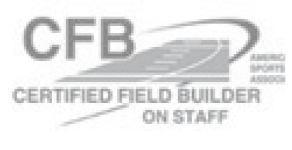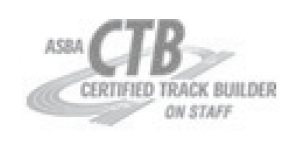The Best Easy Step to Ensure a Successful Athletic Field: Hire an ASBA Certified Field Builder (CFB)

How often have you heard an Athletic Director, School Facilities Administrator, or a Coach lament their field. “It holds water.” “The crown is too tall.” “The lines are not straight.” “It cost us too much money.” “We couldn’t get the installer to come back for maintenance issues.” “The surface is wearing prematurely.” “The project took months longer to build and we had to move games.” There are a whole host of concerns that you’ll hear if you listen long enough. The chances are none of those projects were built by an ASBA recognized Certified Field Builder.
The American Sports Builders Association (ASBA) is a national organization of 400 member companies recognized as a centralized source of technical information about natural and synthetic fields, running tracks and tennis courts. ASBA works to raise professional standards and to ensure owners receive the highest quality services through a Professional Certification Program, Education Initiatives, Construction Guidelines Publications, and Awards.
Why is a Certified Field Builder important when looking at renovating or constructing your facility?
By having passed a rigorous comprehensive exam on field construction and maintenance, Certified Field Builders (CFB) have demonstrated the highest level of expertise.
Certified Builders must be well-versed in project planning, project administration, site work, sub-grade, base work, and maintenance. Certified builders must have at least three years of experience and at least twenty projects built, before even taking a comprehensive exam. They must perform enough athletics construction projects and be invested in their field to justify paying the $600 fee to take the test.
By having specified a Certified Field, you have prevented the average landscaper or a builder, who happens to have a little extra bandwidth, but has very little experience, from cutting their teeth on your project. Unfortunately, many of the folks who offer a price on athletics construction work really do think they are great at what they do, but without a process by which to measure greatness, the owner is the one who suffers. The other challenge with not holding a high enough specification such as requiring a Certified Field, is these less qualified proposers will offer a lower price commensurate with the quality of their work, positioning elected officials to either take the lower bid and suffer the consequences, or to justify why they selected a contractor that is sometimes substantially higher in price.
A Certified Field Builder can help develop a realistic budget, layout, and then build your facility to meet or exceed national best practices. They are best positioned to solve problems as they arise during construction, and adhere to Certified Builder Standards of Conduct. Perhaps as important as having a CFB employed by a construction company, is to have that CFB onsite during construction. ASBA actually forbids a CFB from farming their certification out to help companies meet the standard. A CFB may not have a relationship with more than one company at any given time and may not facilitate any party in misrepresenting itself as having a CFB in order to circumvent a bid contract requirement. That means if an owner specifies the awarded contractor to have a CFB on staff, they actually have to be on staff because that company can not go out and subcontract to an individual who holds this certification to meet the requirement.
In summary, the simplest step you can take to improve the odds of constructing a great athletic field or running track is to specify that the contractor performing the work, and the superintendent onsite during the work, be a Certified Field Builder (CFB). The return on this simple investment will be measured over many years to come with a better performing and safer facility with fewer maintenance problems.











